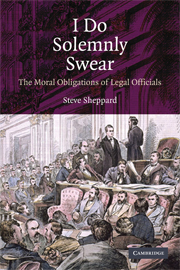Book contents
- Frontmatter
- Contents
- Preface: Moral Officials, Retail Justice, and Three Caveats
- Acknowledgments
- Introduction: Seven Questions about What Is Fit for an Official to Do
- 1 Law and Office
- 2 The Stakes: The Interests of Others in Official Actions
- 3 Officials' Obligations Arise from More Than the Law Alone
- 4 The Moral Obligations of Legal Officials
- 5 Patterns of Relationship between Legal and Moral Obligations
- 6 Breaching Obligations
- 7 Tools for the Trade: Maxims and Fallacies
- Epilogue: What the Official Ought to Do: Law and Justice
- Appendix: Taxonomy of Headings: The Lawes and Libertyes of Massachusetts (Discussed in Chapter 1)
- Index
- References
2 - The Stakes: The Interests of Others in Official Actions
Published online by Cambridge University Press: 05 June 2012
- Frontmatter
- Contents
- Preface: Moral Officials, Retail Justice, and Three Caveats
- Acknowledgments
- Introduction: Seven Questions about What Is Fit for an Official to Do
- 1 Law and Office
- 2 The Stakes: The Interests of Others in Official Actions
- 3 Officials' Obligations Arise from More Than the Law Alone
- 4 The Moral Obligations of Legal Officials
- 5 Patterns of Relationship between Legal and Moral Obligations
- 6 Breaching Obligations
- 7 Tools for the Trade: Maxims and Fallacies
- Epilogue: What the Official Ought to Do: Law and Justice
- Appendix: Taxonomy of Headings: The Lawes and Libertyes of Massachusetts (Discussed in Chapter 1)
- Index
- References
Summary
Those who propose to take charge of the affairs of government should not fail to remember two of Plato's rules: first, to keep the good of the people so clearly in view that regardless of their own interests they will make their every action conform to that; second, to care for the welfare of the whole body politic and not in serving the interests of some one party to betray the rest.
Cicero, On Duties, Book I, Chapter XXVChapter 1 presented one way to understand the law as the result of the actions of officials, in which the law is an archive of rules created by past officials, applied in a current culture of official expectation and practice, in which individual officials carry out their offices with sole discretion yet as part of a corporate whole. A working definition of the official follows from that, which is both formal and functional: an official of the law is any person who holds an office that is given authority by law to act in a way that can alter the opportunities or condition of another person through the apparatus of the legal system. That is hardly a revelation, but it is a necessary foundation for asking what interests different people have in the actions that are taken by anyone holding that office.
There are two broad answers. The first is that the law requires that others care about officials' actions because others must do what officials say.
- Type
- Chapter
- Information
- I Do Solemnly SwearThe Moral Obligations of Legal Officials, pp. 49 - 101Publisher: Cambridge University PressPrint publication year: 2009



